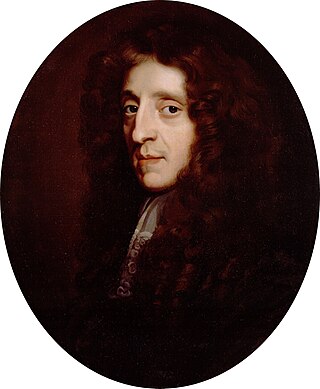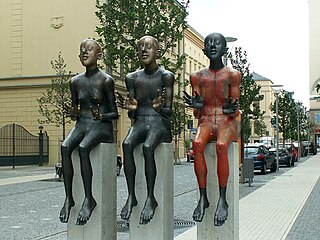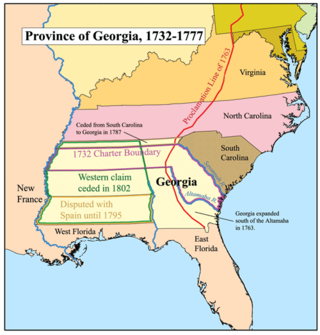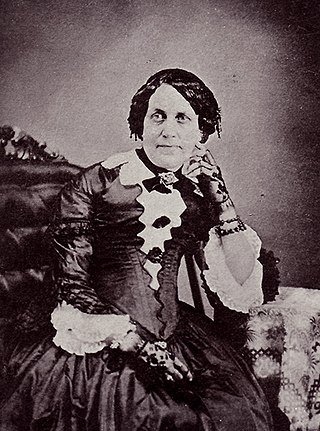Related Research Articles

John Locke was an English philosopher and physician, widely regarded as one of the most influential of Enlightenment thinkers and commonly known as the "father of liberalism". Considered one of the first of the British empiricists, following the tradition of Francis Bacon, Locke is equally important to social contract theory. His work greatly affected the development of epistemology and political philosophy. His writings influenced Voltaire and Jean-Jacques Rousseau, and many Scottish Enlightenment thinkers, as well as the American Revolutionaries. His contributions to classical republicanism and liberal theory are reflected in the United States Declaration of Independence. Internationally, Locke's political-legal principles continue to have a profound influence on the theory and practice of limited representative government and the protection of basic rights and freedoms under the rule of law.

The Maryland Toleration Act, also known as the Act Concerning Religion, the first law in North America requiring religious tolerance for Christians. It was passed on April 21, 1649, by the assembly of the Maryland colony, in St. Mary's City in St. Mary's County, Maryland. It created one of the pioneer statutes passed by the legislative body of an organized colonial government to guarantee any degree of religious liberty. Specifically, the bill, now usually referred to as the Toleration Act, granted freedom of conscience to all Christians. Historians argue that it helped inspire later legal protections for freedom of religion in the United States. The Calvert family, who founded Maryland partly as a refuge for English Catholics, sought enactment of the law to protect Catholic settlers and those of other religions that did not conform to the dominant Anglicanism of Britain and her colonies.
Some philosophers distinguish two types of rights, natural rights and legal rights.

Religious toleration may signify "no more than forbearance and the permission given by the adherents of a dominant religion for other religions to exist, even though the latter are looked on with disapproval as inferior, mistaken, or harmful". Historically, most incidents and writings pertaining to toleration involve the status of minority and dissenting viewpoints in relation to a dominant state religion. However, religion is also sociological, and the practice of toleration has always had a political aspect as well.

The Southern Colonies within British America consisted of the Province of Maryland, the Colony of Virginia, the Province of Carolina, and the Province of Georgia. In 1763, the newly created colonies of East Florida and West Florida would be added to the Southern Colonies by Great Britain until the Spanish Empire took back Florida. These colonies were the historical core of what would become the Southern United States, or "Dixie". They were located south of the Middle Colonies, albeit Virginia and Maryland were also called the Chesapeake Colonies.
The Southern Colonies were overwhelmingly rural, which made slavery and indentured servitude highly used. During a series of civil unrest, Bacon's Rebellion shaped the way that servitude and slavery worked in the South. After a series of attacks on the Susquehannock, attacks that were ensued after the group of natives burnt one of Bacon's farms, Bacon's arrest, along with other arrest warrants, were issued by Governor Berkely, for attacking the natives without his permission. Bacon avoided detainment, though, and then burnt Jamestown, in opposition of the governor previously denying him land in fear of native attacks, however Bacon hadn't believe his policies were entirely conventional, saying that they didn't ensure protection to the English settlers, as well as the exclusion of Bacon from Berkeley's social clubs and friend groups. The rebellion dissolved sometime in 1676, following Charles II's initial sending of troops to restore order in the colony. This rebellion influenced the view of the Africans, helping create a completely African servitude and workforce in the Chesapeake Colonies, alleviating primarily White servitude, a working-class that could be repugnant at times through disobedience and mischief. This also helped racial superiority in White regions, helping the poor White and wealthy White people, respectively, feel almost equal. It diminished alliances between White and Black people, happened in Bacon's Rebellion.
The colonies developed prosperous economies based on the cultivation of cash crops, such as tobacco, indigo, and rice. An effect of the cultivation of these crops was the presence of slavery in significantly higher proportions than in other parts of British America.

Two Treatises of Government is a work of political philosophy published anonymously in 1689 by John Locke. The First Treatise attacks patriarchalism in the form of sentence-by-sentence refutation of Robert Filmer's Patriarcha, while the Second Treatise outlines Locke's ideas for a more civilized society based on natural rights and contract theory. The book is a key foundational text in the theory of Liberalism.

A Letter Concerning Toleration (Epistola de tolerantia) by John Locke was originally published in 1689. Its initial publication was in Latin, and it was immediately translated into other languages. Locke's work appeared amidst a fear that Catholicism might be taking over England, and responds to the problem of religion and government by proposing religious toleration as the answer. This "letter" is addressed to an anonymous "Honored Sir": this was actually Locke's close friend Philipp van Limborch, who published it without Locke's knowledge.

Gangraena is a book by English puritan clergyman Thomas Edwards, published in 1646. A notorious work of heresiography, it appeared the year after Ephraim Pagitt's Heresiography. These two books attempted to catalogue the fissiparous Protestant congregations of the time, in England particularly, into recognised sects or beliefs. Pagitt worked with 40 to 50 categories, Edwards went further with around three times as many, compiling a list of the practices of the Independents and more extreme radicals:
Thomas Edwards, in his Gangraena (1645), enumerated, with uncritical exaggeration, no less than sixteen sects and one hundred and seventy-six miscellaneous "errors, heresies and blasphemies," exclusive of popery and deism.

The Fundamental Constitutions of Carolina were adopted on March 1, 1669 by the eight Lords Proprietors of the Province of Carolina, which included most of the land between what is now Virginia and Florida. It replaced the Charter of Carolina and the Concessions and Agreements of the Lords Proprietors of the Province of Carolina (1665). The date March 1, 1669 was the date that proprietors confirmed the Constitutions and sent them to the Colony, but later on two other versions were introduced in 1682 and in 1698. Moreover, the proprietors suspended the Constitutions in 1690. Despite the claims of proprietors on the valid version of the Constitution, the colonists officially recognized the July 21, 1669 version, claiming that six proprietors had sealed the Constitutions as "the unalterable form and rule of Government forever" on that date. The earliest draft of this version in manuscript is believed to be the one found at Columbia, South Carolina archives.
In political philosophy, the right of revolution is the right or duty of a people to "alter or abolish" a government that acts against their common interests or threatens the safety of the people without cause. Stated throughout history in one form or another, the belief in this right has been used to justify various revolutions, including the American Revolution, French Revolution, the Russian Revolution, and the Iranian Revolution.

Proslavery is support for slavery. It is sometimes found in the thought of ancient philosophers, religious texts, and in British writings and in American writings especially before the American Civil War but also later through the 20th century. Arguments in favor of slavery include deference to the Bible and thus to God, some people being natural slaves in need of supervision, slaves often being better off than the poorest non-slaves, practical social benefit for the society as a whole, and slavery being a time-proven practice by multiple great civilizations.

Essay on the First Principles of Government (1768) is an early work of modern liberal political theory by 18th-century British polymath Joseph Priestley.
Liberalism is a political and moral philosophy based on the rights of the individual, liberty, consent of the governed, political equality, right to private property and equality before the law. Liberals espouse various views depending on their understanding of these principles but generally support private property, market economies, individual rights, liberal democracy, secularism, rule of law, economic and political freedom, freedom of speech, freedom of the press, freedom of assembly, and freedom of religion, constitutional government and privacy rights. Liberalism is frequently cited as the dominant ideology of modern history.
Edward Bagshaw (Bagshawe), the younger (1629–1671) was an English Nonconformist minister and theologian, known as a controversialist. His sympathies were with the fringe Independent sects of the Commonwealth period, and after the English Restoration of 1660 his life was embattled. Richard Baxter criticized Bagshaw as "an Anabaptist, Fifth Monarchy man, and a Separatist".
Jonas Proast (c.1640−1710) was an English High Church Anglican clergyman and academic. He was an opponent of latitudinarianism, associated with Henry Dodwell, George Hickes, Thomas Hearne and John Edwards. He is now known for his controversy with John Locke, over Locke's Letter concerning Toleration.
Thomas Long (1621–1707) was an English clergyman and writer on Church politics. He spent almost all of his life in Exeter.
Samuel Bolde (1649–1737) was an English clergyman and controversialist, a supporter of the arguments of John Locke for religious toleration.

Atheism, as defined by the entry in Diderot and d'Alembert's Encyclopédie, is "the opinion of those who deny the existence of a God in the world. The simple ignorance of God doesn't constitute atheism. To be charged with the odious title of atheism one must have the notion of God and reject it." In the period of the Enlightenment, avowed and open atheism was made possible by the advance of religious toleration, but was also far from encouraged.

The Toleration Act 1688, also referred to as the Act of Toleration, was an Act of the Parliament of England. Passed in the aftermath of the Glorious Revolution, it received royal assent on 24 May 1689.
Awnsham Churchill (1658–1728), of the Black Swan, Paternoster Row, London and Henbury, Dorset, was an English bookseller and radical Whig politician who sat in the English and British House of Commons from 1705 to 1710.
References
- 1 2 3 Thomas, D.O. (1968). John Locke: Two tracts on government. Philosophical Books, 9(2), 1-3.
- ↑ Encyclopedia Britannica, John Locke.
- ↑ Armitage, David Armitage, D. (2004). John Locke, Carolina, and the two treatises of government. Political Theory, 32(5), 602-627.
- ↑ WALBERT, D. (2008). A little kingdom in Carolina.
- ↑ Slavery and London, Seán Mac Mathúna
- ↑ Harris, T., & Taylor, S. (2015). The final crisis of the Stuart monarchy: the revolutions of 1688-91 in their British, Atlantic and European contexts (Vol. 16). Ch. 3: Whig Thought and The Revolution of 1688-91, John Marshall. pp. 75-76, Boydell & Brewer.